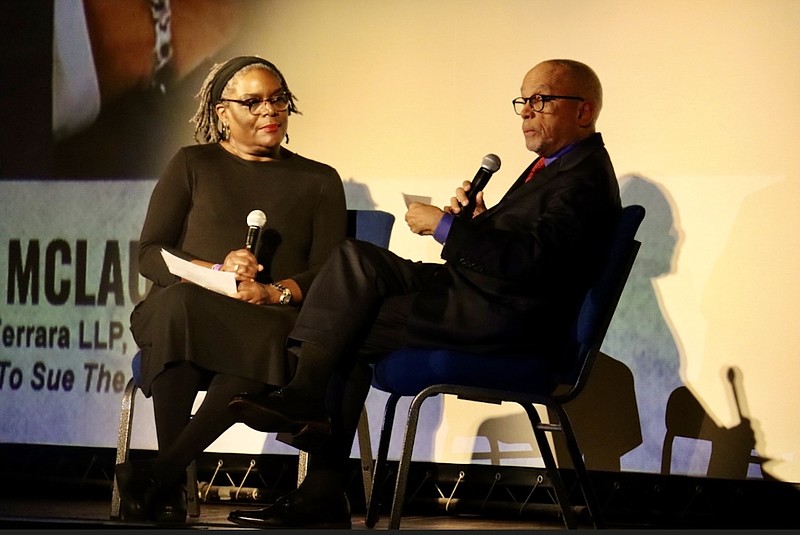The story of five Chattanooga women who fought the Ku Klux Klan in a landmark 1982 civil case is memorialized in the documentary "How to Sue the Klan," which premiered locally Friday night at the Walker Theatre.
Viola Ellison, Lela Evans, Fannie Mae Crumsey, Katherine Johnson and Opal Jackson's bravery led to an injunction against all KKK activities in Chattanooga and drove the group out of the city forever, attorney Randolph McLaughlin said.
"To this day, there has never been another act of Klan violence in this city," McLaughlin said.
Hundreds of people attended the local premiere of the 35-minute film, which was produced by prominent civil rights attorney Ben Crump. The audience often erupted into applause as they watched the documentary, listened to Erika Roberts read her poem "Threads" and heard a panel discussion focused on racially motivated hate in America.
(READ MORE: Cook: The time has come for the story of the five women who defeated the Klan)
On April 19, 1980, four Black women were waiting for a cab on Ninth Street (now M.L. King Boulevard) when three local Klansmen drove by firing shotguns from an open window, according to the documentary. All four women were wounded, and a fifth was hit by flying glass.
The three Klansmen were arrested and tried in Criminal Court, but an all-white jury acquitted two of them, according to the documentary. The third man was sentenced to nine months in jail and served six.
Ellison, Evans, Crumsey, Johnson and Jackson were left to recover from their injuries in fear for their lives, according to the documentary. In an act of defiance, they sued the shooters in federal civil court and emerged victorious.
McLaughlin, who represented the five Chattanooga women, argued they were entitled to compensation based on the 1871 Ku Klux Klan Enforcement Act, the documentary shows. It was meant to allow survivors of civil rights violations to sue for damages in federal civil court when the criminal court failed.
The women were awarded $535,000 in damages, which is today's equivalent of more than $1.5 million, the documentary shows. They never received that money, but it set a nationwide legal precedent that allowed many subsequent lawsuits to chip away at the KKK's funding over time.
It essentially made it financially unsustainable to kill Black people and acted as a deterrence from hate crimes, Crump said in the documentary.
"If there is anything America understands," Crump said, "it is money."
Crump was not in attendance because he is representing the family of Tyre Nichols, who died last year after being beaten by Memphis police officers. He has worked on several other high profile cases, including those of George Floyd, Trayvon Martin and Breonna Taylor.
(READ MORE: Cook: Local Klansmen shot these women. Do you know what they did next?)
The case law set in the five Chattanooga women's lawsuit is being used today at a time when hate crimes are on the rise, McLaughlin said.
Just three years ago, the Confederate flag flew in the halls of Congress during the Jan. 6, 2021, breach of the U.S. Capitol, he said. The civil rights movement is ongoing.
The faces of the five Chattanooga women are featured in a mural on EPB's 10th Street power station, but that is not enough, McLaughlin said. He referenced visiting the city's memorial honoring Ed Johnson, who was lynched off the Walnut Street bridge in 1906.
McLaughlin said he would like to see a similar memorial for the five women in Miller Park near the building where the legal battle took place.
"Don't celebrate the violence," he said. "Celebrate the victory."
Jackson is the sole surviving member of the five women. The documentary is a reflection of Chattanooga's testament to embracing the complexity of its history, Shadrina Booker, the city's director of community engagement, said at the premiere.
Justice may be delayed, but it will not be denied as long as the people are willing to fight for it, Crump said in a recorded statement.
Contact Sofia Saric at ssaric@timesfreepress.com or 423-757-6476.
